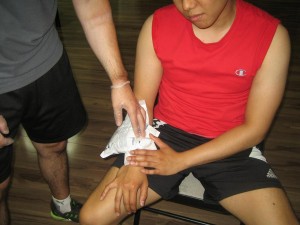A number of contagious diseases can be transferred from one person to another by hands which contain germs, mainly gastrointestinal illnesses, flu and hepatitis A. Washing your hands appropriately can help stop the spread of the germs that cause these diseases.
Some types of gastroenteritis can cause severe problems, particularly for young children, the old, or those with a weak immune system. Drying your hands correctly is as significant as washing them. Germs can easily lead to flu if hands are not washed correctly.
When To Wash Your Hands
You should wash your hands carefully:
- Before cooking food
- Before eating a meal
- Between touching uncooked and cooked food
- After using the toilet or changing nappies
- After smoking
- After blowing your nose with a tissue or handkerchief
A number of contagious diseases can be transferred from one person to another by hands which contain germs - After managing refuse or operating in the garden
- After touching animals
- After attending to ill kids or other relatives.
How To Wash Your Hands Properly
To wash hands properly:
- Soak your hands with lukewarm water.
- Use one dose of liquid soap well for about 20 seconds or longer if the grime is embedded in your skin.
- Massage hands together quickly across all surfaces of your hands to help eliminate grime and microorganisms.
- Don’t disregard the back of your hands, your wrists, and beneath your fingernails.
- If possible, take off rings prior to washing your hands, or make sure you shift the rings to wash beneath them, as bacteria can live under them.
- Soak well underneath the running water and make certain all traces of soap are gone, as residues might cause irritation.
- Dry underneath any rings you wear, as they can be a starting place for future contamination if they stay damp
- At home, offer each family member their own towel and clean the towels regularly.
Use Warm Water
If you don’t have access to hot water then cold water will do for a one-off hand wash, but should not be used all the time as cold water is not as effective as hot water. Soap also foams better with hot water. The active elements on the exterior of the soap are released more effortlessly, making them more useful in cleaning your hands of grime, grease and oils.
Soap Is Important
Soap includes ingredients that will assist to:
- Loosen grime on your hands.
- Soften water, making it simpler to rub the soap across your hands.
- Clean your hands, leaving no residues to harm and dehydrate your skin.
- Soaps can have diverse pH levels – they might be neutral, a little alkaline or somewhat acidic. That’s why a few soaps irritate some individuals and not others. Fragrance contained in soap can be another cause why some individuals have skin allergies.

